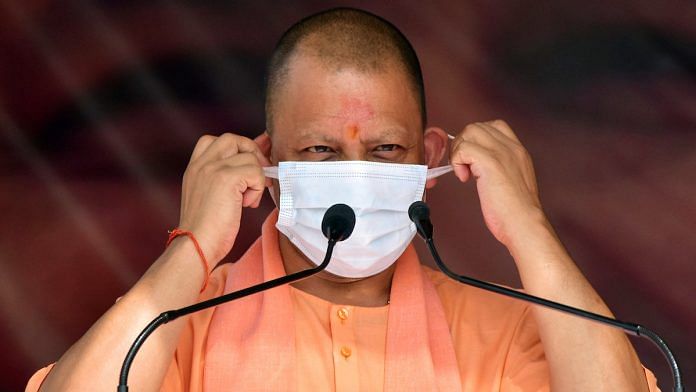Assam’s Himanta Biswa Sarma and Uttar Pradesh’s Yogi Adityanath are arguably the Bharatiya Janata Party’s most prominent, vocal and projected chief ministers today. And incidentally, both don’t have what is considered a key requirement for holding any powerful post in the BJP — a Rashtriya Swayamsevak Sangh (RSS) background.
Yet, both leaders have ensured they become as RSS as one can — assimilating fully into the Sangh culture, not allowing their distinct backgrounds to become a hindrance and more than following the umbrella outfit’s trope.
The tale of these two chief ministers, in a nutshell, tells us the story of the evolving BJP-RSS culture. The success of RSS is no longer necessarily in hoisting more RSS-raised leaders, but in finding new and willing RSS clones. Boasting of a Sangh background is no longer a necessary condition to be successful in the BJP and hold powerful positions.
But this does not mean that the core of the RSS-BJP is changing, or that the two are moving apart. It merely indicates that as the party expands, particularly into inorganic and new territories, the BJP remains aware of the limitations of relying compulsorily on the RSS-grooming requirement. So now, the tactic is to RSS-ise ‘outsiders’ and make them its own.
Also read: Modi’s phone call to Neeraj Chopra, Paralympic winners was also a gold — politically
The ‘RSS-ised’ CMs
It’s astonishing how despite not having been Sangh karyakartas or pracharaks, both Yogi Adityanath and Himanta Biswa Sarma speak the language and preach the agenda of the RSS.
From making the anti-cow slaughter law of 1955 more stringent to bringing in the Prohibition of Unlawful Conversion of Religious Ordinance, 2020, commonly known as ‘love jihad’ law, and ushering in a strict population control policy — Yogi Adityanath has led the way for other BJP chief ministers, fulfilling the RSS agenda to the hilt.
In fact, my colleague D.K. Singh had rightly argued how Adityanath has become a “role model” for other BJP CMs, including veterans like Shivraj Singh Chouhan.
A star campaigner for the BJP, Adityanath generously throws in ‘Ali-Bajrang Bali’ kind of divisive rhetoric in his speeches. He is literally a saffron-clad torchbearer of Hindutva politics.
A bigger surprise, however, is Himanta Biswa Sarma. A leader who learnt his politics in the Congress, remaining a close aide of Assam’s former chief minister Tarun Gogoi for many years, he has now turned into a rabid majoritarian politician. He seems to be proving the proverb ‘more loyal than the king’ right, with the language — both political and policy wise — that he speaks.
Thus, if Adityanath has a cow protection plan, can Himanta be far behind? And if the Uttar Pradesh chief minister wants to ensure there is a check on population, effectively to control fertility rate among Muslims, why should his Assam counterpart not follow suit?
Himanta has not shied from pushing for RSS-BJP’s pet Citizenship (Amendment) Act, never mind if it goes against the very tenets of Assam’s ethnicity struggle. From his ‘Jinnah legacy’ comment to concerns of Hindus in Assam becoming a ‘minority‘ — the chief minister, who recently completed 100 days in office, has done every bit to become a Nagpur favourite. Even Sarma’s predecessor in Assam — Sarbananda Sonowal — comes from a non-Sangh background.
Other prominent examples that stand out are former Rajasthan chief minister Vasundhara Raje Scindia and veteran leader Sushma Swaraj, who also did not have an RSS background. But they were more of an aberration than the norm.
Other imports like Jyotiraditya Scindia are also slowly assimilating into the RSS-BJP worldview and culture.
Also read: Modi-Shah BJP didn’t learn any lesson from Covid 2nd wave. Jan Ashirwad Yatras are proof
The paradigm shift
This trend in the BJP is a significant shift from the emphasis on Sangh-grooming. There was a belief that even if you did get a place in the BJP, you wouldn’t reach the higher echelons if you came from a non-RSS background.
My colleagues Shanker Arnimesh and Neelam Pandey did some number crunching in early 2020 to find out that as many as three out of four ministers in the Narendra Modi government were rooted in the Sangh. They also found that one out of five BJP MPs associated with the RSS were appointed ministers in the Narendra Modi cabinet in 2019. This figure is representative of a larger, unwritten but well-established, rule in the BJP.
Of course, there are several names — including Union ministers Smriti Irani, S. Jaishankar and Piyush Goyal — who don’t have the Sangh card but have done well for themselves in the BJP.
But the stories of Himanta Biswa Sarma and Yogi Adityanath stand out because these two have shown how it’s not only possible to reach the top in the BJP minus an RSS background, but also dominate and become the party’s poster boys and flag bearers.
Inclusion of such leaders is a sign of growing pragmatism in the Sangh-BJP ecosystem. When you expand and become a national party of this nature, you need to allow ‘outsiders’ to join and grow. I had once argued that Himanta Biswa Sarma has everything that it takes to become the next Amit Shah, except the RSS. But given how things seem to be changing in the BJP, both Yogi Adityanath and Sarma have every chance of springing into the national scene to lead the party.
Views are personal.
(Edited by Anurag Chaubey)



